The Home Front is an ongoing series where we highlight the mission and ministry taking place around our territory. We will visit each Canadian province and territory, as well as Bermuda, and celebrate the innovation and impact the Army is having in corps, social services and youth ministry.
CARE PACKAGES IN WINNIPEG
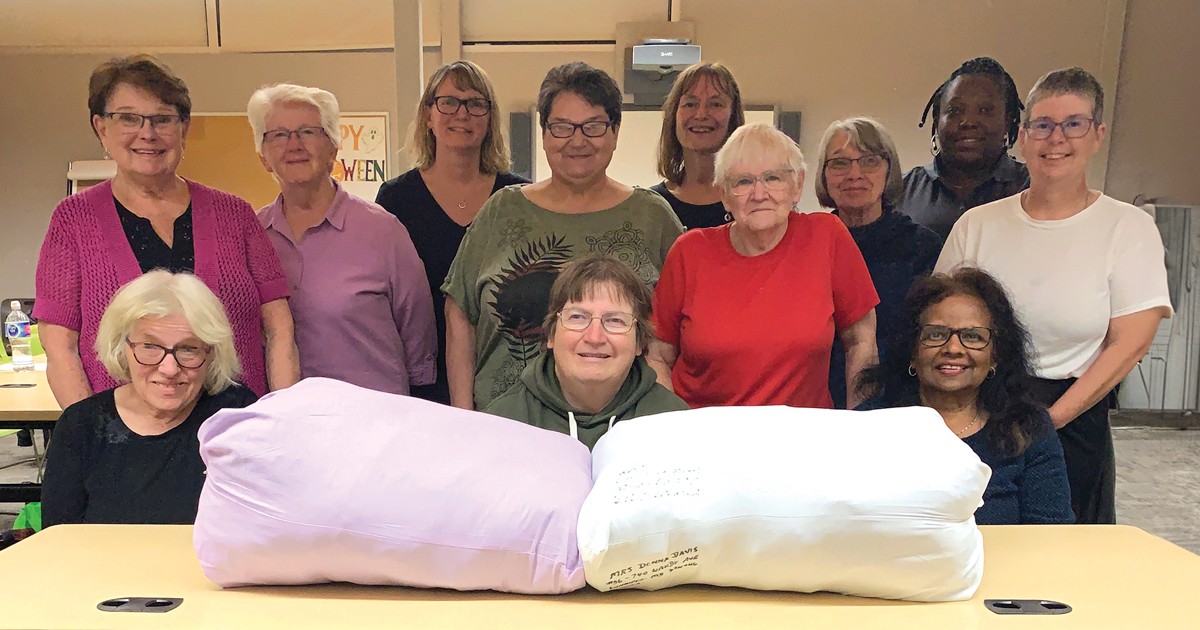
for Salvation Army officers and staff working outside of Canada
For nearly a hundred years, the women’s missionary group at Living Hope Community Church in Winnipeg has faithfully provided care packages and supplies to Salvation Army officers and staff working outside of Canada.
“While the group and Living Hope firmly support Partners in Mission, our projects, though smaller, help reveal Jesus’ personal love by impacting those who receive the items,” explains the group’s leader, Donna Davis, who has spent 50 years volunteering. “There’s a deep-seated, peaceful joy that seeps into us when we share our abundance. It motivates us to love and give continually. It inspires and deepens our faith.”
In recent decades, the group has sent approximately 22 parcels each year. After consulting with their contacts to discover what people around them need, packages filled with toiletries, clothing, and medical, craft and school supplies are shipped across the globe to support officers and their communities.
The women’s efforts are currently helping the Home for Abused Women, and the officers and children’s aid program in Papua New Guinea, the Mitanda Home for the Aged and Chikankata Hospital in Zambia, and Mchinji Anti-Child Trafficking Centre in Malawi.
Davis shares examples of how their packages have made an impact:
- Supplies from a recent parcel were delivered to Papua New Guinea’s remote highland areas to support retired officers whose homes were destroyed in tribal fighting, as well as cadets at the training college.
- Wool included in one parcel helped a single mother, whose wages only covered basic needs, to make and sell bags for extra money. As well, she was supplied with bedsheets and her school-aged boys received pencils, stationery and lined paper.
- A man in Zambia whose home had burned down was in the Salvation Army social work office when a package arrived. The workers gave him items from the parcel, showing him that somebody cared about him and his family.
Davis understands that a few parcels may “seem like a stone dropped into that sea of need, but as ripples of love move out from the centre, only God knows just whose lives are touched and changed.
“We might not know on earth how a person has been blessed,” she continues. “But, if we give them something they needed that day and it showed them love, it might bless them their whole life. It doesn’t have to be big, but it becomes big in their life.”
—by Nathan Reid-Welford
CALLED 2 GREATNESS IN BRANDON, MAN.
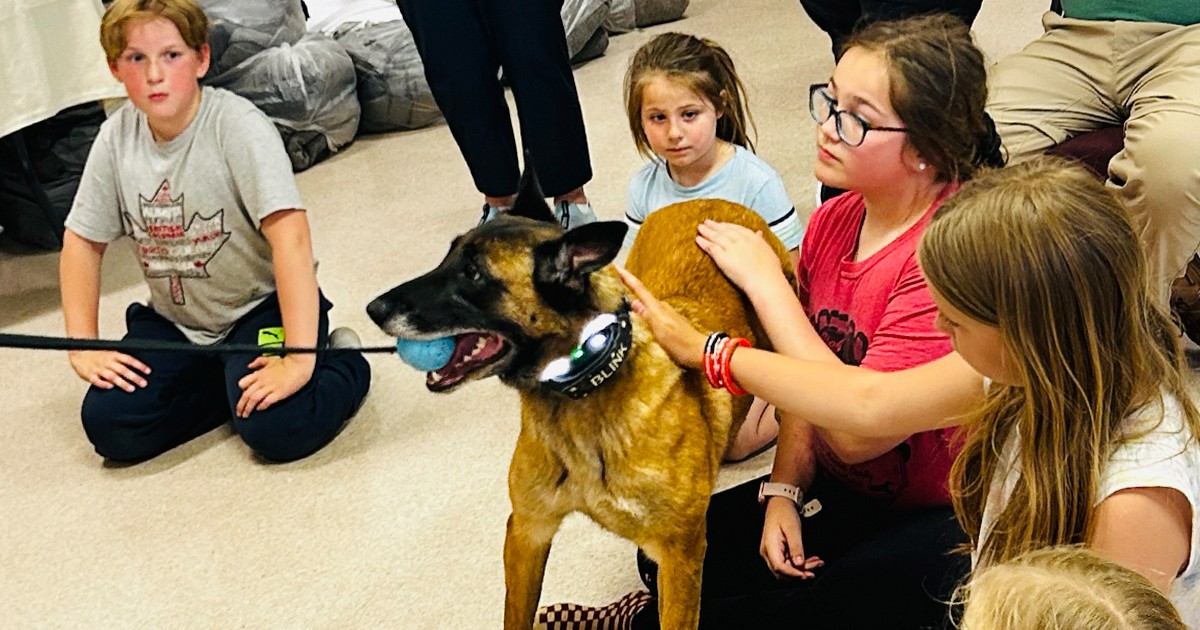
a police officer gives a presentation on community safety with his dog, Blink
(Photos: Mjr Jamie Rands)
Every Tuesday afternoon, about 15 kids, from kindergarten to Grade 8, gather for Called 2 Greatness, an after-school program at the Brandon Corps, Man.
“We believe that our youth are destined for greatness, both within the kingdom and in the world,” says Major Jamie Rands, corps officer. “Our program provides a platform for them to develop their leadership skills, life skills and faith, enabling them to achieve their full potential and make a meaningful difference in this world.”
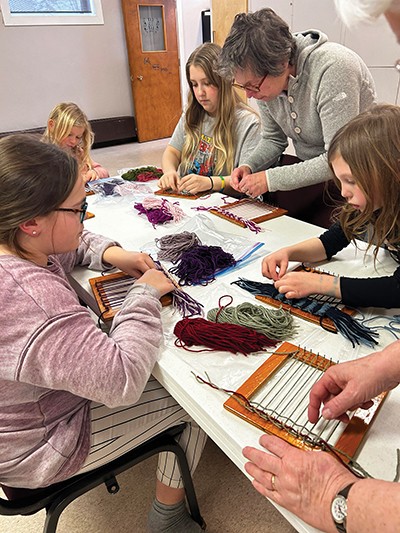
Each week, the kids get to try their hands at different activities, such as crafts, baking and woodworking. They have built birdhouses, created stained-glass artwork and woven squares on a pin loom. A guest visit from a police officer, who gave a presentation on community safety with his dog, Blink, was a highlight. Another fun event was an escape room, with the kids completing missions to collect pieces of a puzzle, leading them to a model figure of Jesus.
The program is led by Charlette Fontaine, community and family services co-ordinator.
“I love kids,” she says. “When I became a senior soldier in 2016, I knew I wanted to do something to share God’s love with kids, to show them how awesome he is, and that he’s with you no matter what.”
Every week includes an interactive devotional time, and they often sing camp songs as their grace before snack. Most of the kids don’t attend the corps on Sunday, and prayer is unfamiliar.
“We have one boy, who doesn’t have a Christian background, who told his mom that they have to pray, because that’s what he does at church. So now they’re praying at mealtimes,” says Fontaine.
The program opens the door to many conversations about faith.
“They love asking questions,” says Fontaine. “One little girl asked me, ‘How do you even know God is there?’ I said, ‘How do you know air is there?’ ‘I breathe in and out.’ I said, ‘God gave you that gift to breathe in and out, and that’s him coming in and going out.’ ”
Last Christmas, they invited the families to attend a special service for the “hanging of the greens,” the tradition of explaining the significance and symbolism of Christmas decorations. The children also performed a play, explaining what Christmas is all about.
COLLECTIVE KITCHENS IN PORTAGE LA PRAIRIE, MAN.
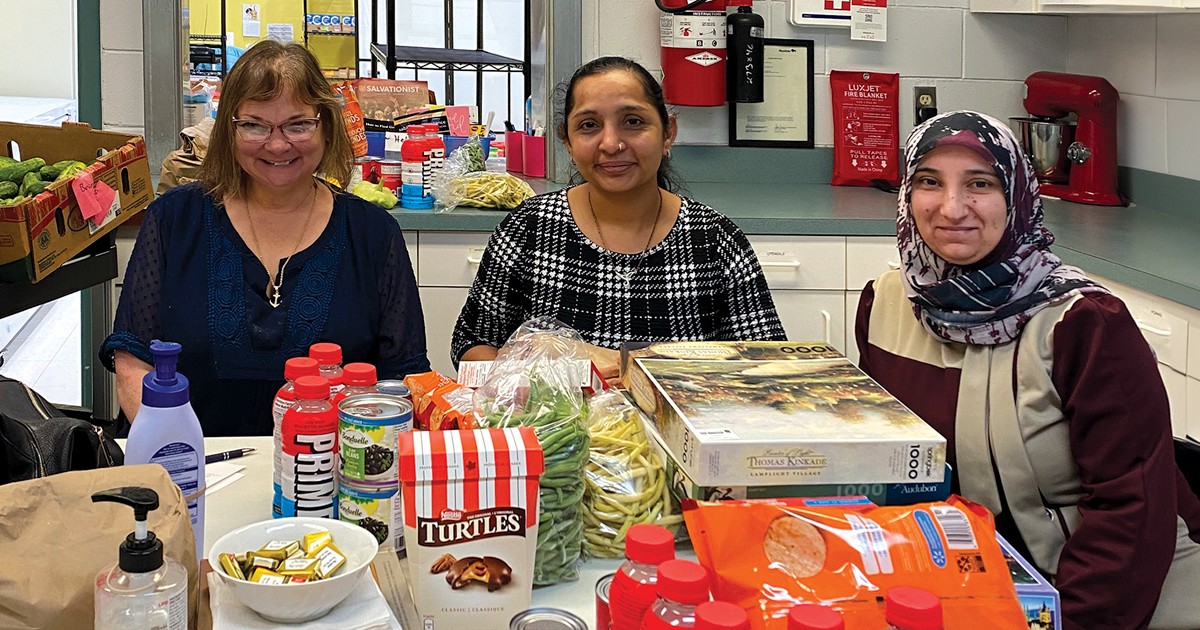
In the kitchen at The Salvation Army in Portage la Prairie, Man., the counter is piled high with a week’s worth of groceries. Soon, a small group of people will be cooking up a storm—peeling potatoes, chopping onions and browning beef on the stove—preparing five delicious meals to take home to their families. They’re part of a cooking program known as a “collective kitchen.”
“There’s a lot of poverty in Portage la Prairie. It’s much higher than in Winnipeg or Brandon,” says Major Brenda Hammond, corps officer. “If you don’t have enough money to make ends meet, then a collective kitchen can change your world. It means you can divide your grocery money for the month over three weeks, rather than four.”
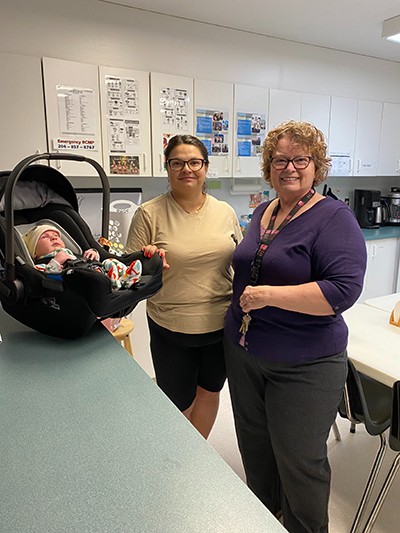
in a "collective kitchen"
Each “kitchen,” or cooking group, of four people meets twice a month—once to plan and once to cook. They scout for sales in grocery store flyers, see what’s available in the food bank and choose their recipes. Participants contribute $5 per person in their family, and the Army adds another $80. Although each group has a facilitator, their main role is to keep things running, rather than teach cooking skills.
“That’s what’s so empowering,” says Major Hammond. “The group decides when and what they’re going to cook and do their own shopping. We just make sure they take home a generous amount of food.”
While it’s not a cooking class, participants learn from each other and grow in confidence as they try new foods and new recipes. They also start to support each other as they chop, stir and sauté.
“They tell stories, talk about their kids and problem solve,” says Major Hammond. “When one of the women in the newcomers group, from Ukraine, had a baby and wasn’t able to attend, they cooked for her and dropped off the meals.”
Right now, there are four collective kitchens, but Major Hammond hopes it will grow to 10.
“It’s the right program for here,” she says. “Every one of us has been there—never mind people who are struggling financially. It’s the end of the day, you’re tired, you didn’t get any meat out of the freezer. We end up making the same food week after week because we’re just too tired to try something new. This is like HelloFresh for real people.”
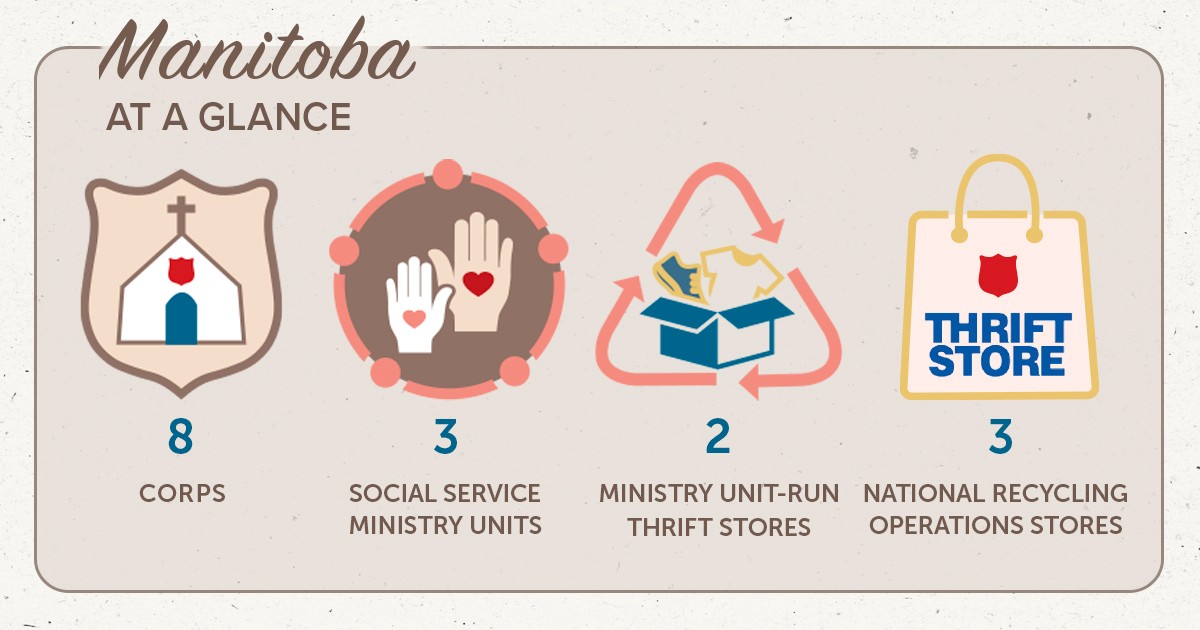
Manitoba
At A Glance
Lt-Colonel Donald Bladen
Divisional commander
Lt-Colonel Donna Bladen
Divisional officer personnel secretary and divisional spiritual life development secretary
8 Corps *
3 Social Service Ministry Units **
2 Ministry Unit-Run Thrift Stores
3 National Recycling Operations Stores
*Due to its location, the Fort Frances Corps, Ont., which also operates a thrift store, comes under the Prairie Region of the Prairies and Northern Territories Division
**Due to its location, the Kenora, Ont., community service centre, which also operates a thrift store, comes under the Prairie Region of the Prairies and Northern Territories Division
This story is from:




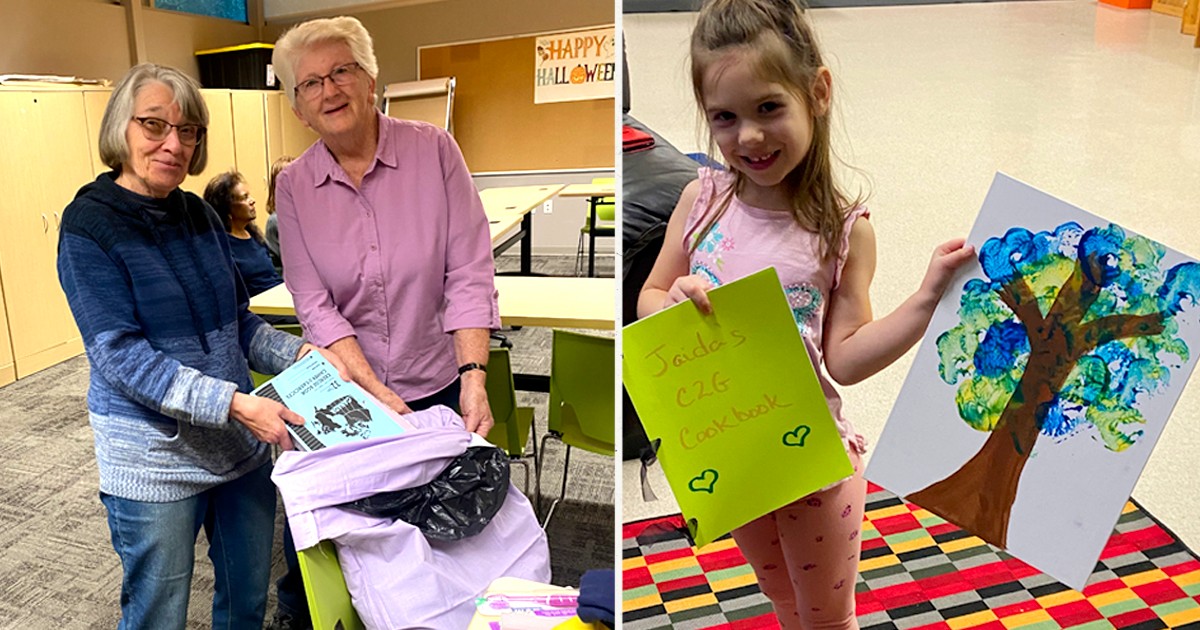





Leave a Comment